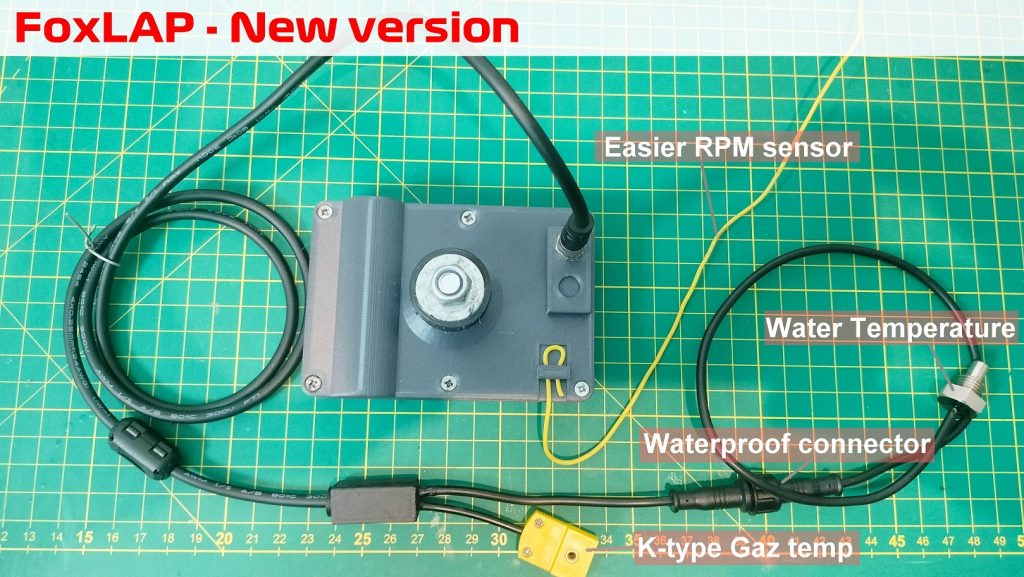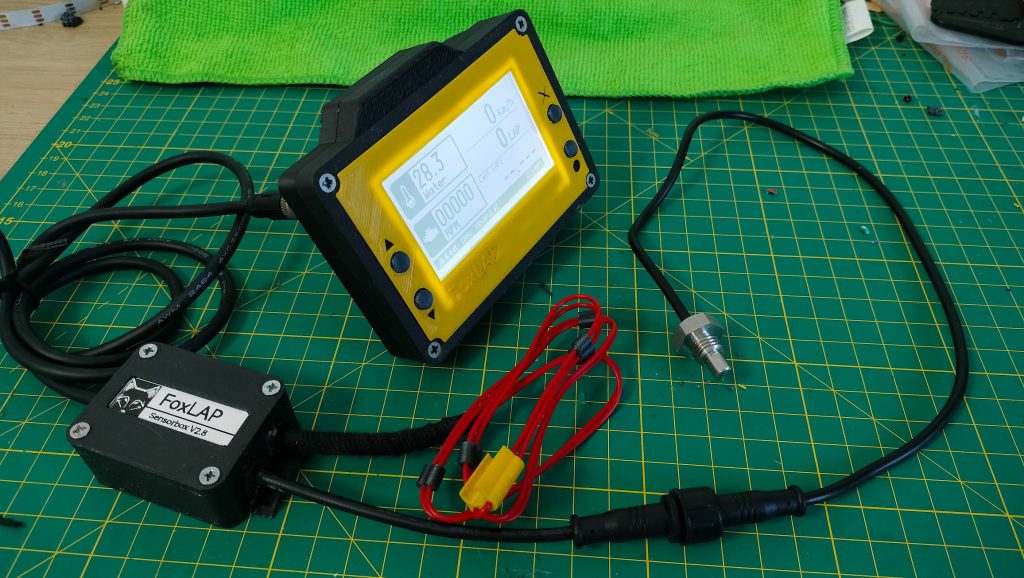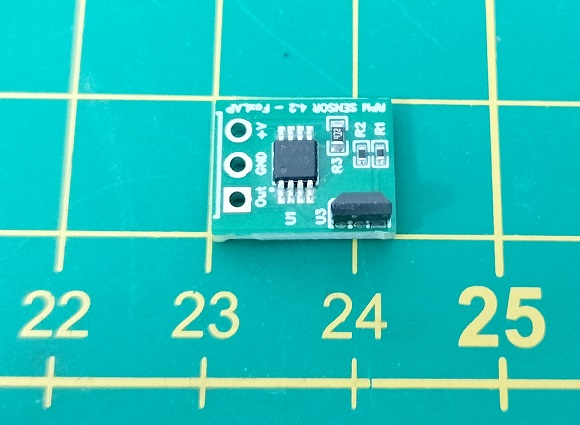So far, The FoxLAP device is able to get the RPM, the Water Temperature, Exhaust gaz temperature and now the oxygen (lambda sensor).. i know you want more
1-RPM, water temperature and gaz temp
Connected to the main device with an M8 aviation connector, you will find the water temp sensor (removable with a waterproof connector) and the K-type connector for gaz temp. The yellow cable is the RPM cable (i’m sure you know where you must clip it).

I made new water temperature connectors because I wasn’t happy with the old one. Now I think water, dust and vibration will never be a problem again.
2- Exhaust gaz temperature
Nothing revolutionnary about this probe, this is a classic K-type sensor. and the foxLAP device is compatible with AIM EGT sensor for example.
3- Lambda Sensor
This is the last sensor i was working on. As I write these lines, I haven’t tested it yet on the track but I’m sure it will work 🙂 (i hope)
This is a prototype. i had to make a lambda controller to control the lambda probe: drying, heating, etc… The goal is to know in real time the oxygen level in the combustion gases, get the Lambda value and of course the AFR (Air Fuel Ratio).
The goal is to know if the carburation settings are good or not… I was tired of hearing advice I didn’t understand:
“Um, you must be lean today…” But Lean compared to what????
“Umm, you must enrich your mixture…” But how much should I enrich????
“The GoKart universe”, everybody seems to know what to do only by putting the finger in the exhaust pipe :-)…. no, i will never put my finger in the exhaust pipe okay? that’s why i made this sensor.

This new sensor is using ESPNOW wifi protocol to send the values to the FoxLAP device. I will probably modify the external sensors to give them the wireless power… i’m tired about cables.
And wireless (ESPNOW) will allow you to build and add your own sensors (proximity sensors, wheel or whatever you want), without the need of cables. I will just publish the protocol i made with packet structures (c code)… but i dont know when, time is my enemy, i’m so busy…
Update and conclusion: The feedback is not good. A lambda probe mounted on a 2-stroke engine is killed after only a few runs. The development of this probe is therefore stopped. Lambda probes are expensive and there is no point in having to replace the probe every 10 sessions.
News from August
After a small and well deserved pause from this time consuming project, i am updating the DIY version to get some external sensors working (water temperature + RPM). I had to modify the STL file in order to add an external plug (my 3D printer was broken so it took time to get it working :-/).

News from September

I have a new version. I have simplified the external sensors part. I found my external sensor system still too complicated. So I worked on simplifying it. My RPM sensor looks like what Alfano or Mychron does now… Easy to install and easy to remove
News from November:
The DIY version now also works with the same external sensors as the dedicated board.
I made a dedicated board for RPM. This RPM sensor is based on the Hall effect. The first version worked by induction. Induction worked very well but you had to connect a cable and deal with EMI.
I calibrated this sensor for both 4-stroke and 2-stroke engines. The main advantage is that you don’t need to connect any cables anymore. Just make a few turns with a cable around the spark plug (5 or 6 loops with 4-stroke engines and only 1 loop for 2-stroke engines) and place the other end of your “pigtail” cable near the sensor.

I will sell this sensor for those how are interested.
Now that everything is ready, i’m currently working on the updated tutorial to add external sensors in the DIY version.
Absolutely fabulous!
I’m fascinated about your ideas, I check several times a day your site to see if there are any news The wireless connection of the sensors to the main unit it’s a great idea but that comes with a few disatvantages: like: EM problems, regularly charging batteries, and the most important aspect you have to turn on the sensors before entering the track, if you forger to turn them on you don’t have any data.
I just want a unit in this stage of development, with rpm and water sensors to test it. As an ideea you can sell different versions, and the price should increase as you add more and more sensors wired or wireless. Having a few units in racing world will also help you develop future versions and check for bugs.
Diy Foxlap can use sensor`s too? Or I need to purchase your board?
hiii!!!
More news??
Welcome back,
So to add the new features (rpm and water) is necessary to reprint 3D the case?
Anything I have to modify I’ll do it with pleasure, just publish the files, the new pinout schematic and the electronic components list for the rpm/water.
What a great project, it works so well.
Adding sensors will be terrific, can’t wait till they are included in the DIY version.
Wireless with ESPnow will make this project exceptional.
When do we have the chance to see what’s inside of that magic sensor box?
Great, I can’t wait for the 1.3 update for the DIY version. There is some problem with GPS. In version 1.2, when a GPS receiver is connected, it only works at a frequency of 1hz. I connected the receiver to the computer, set the speed to 10hz, but after connecting to the DIY device, the frequency was reset to 1 hz again. I’ve tried different receivers: neo-m6, new-m8. But the result is the same. If you set any receiver to 10hz and then hot-plug to the device , then 10hz appears on the laptimer. But after the reboot, the frequency drops back again.
We are waiting for the new 3D case model files and the new electronic components+sensors list and schematics.
Hey,
I can’t wait to get mine up and running and test it, it’s an amazing project! 🙂
On the lambda sensor topic, I also had the same idea but after a bit of research I’m afraid that it won’t really work with 2 stroke engines as the oil and the vibrations will likely kill the lambda sensor very quickly (if I recall correctly we had a customer years ago that spent a fortune on replacing AIM O2 sensors only to go back to the standard EGT) but I’d love to see how the experiments go!
As a side project I’d love to experiment with other, simpler, sensor setups that can help getting more meaningful data out of the EGT, I think it’s possible to get even better results compared to a lambda on 2 stroke engines.
Thanks for your message. I’m writing the final version of the tutorial with external sensors. This project took a lot of time. The biggest difficulty is that everything I did I had to test on the track, in real conditions (A very very long process).
For the lambda sensor, you are absolutely right. The lambda probe is killed after 10 run mounted on a 2 stokes engine… big fail. i’m not gonna include it. Even if it’s not reliable in long term (even in the short term, 10 runs and the lambda probes tell you that the composition of the atmosphere is close to that of Mars), I learned from it.
Yeah, I know, testing these things require a lot of time and effort. I’ve been around karting enough to have seen plenty of that but that’s the beauty of it!
If you need any kind of help with testing or writing stuff (even just docs) let me know!
I want to be the first to buy the rpm sensor as I was the first to build the DIY version. Let me know when is available for sale, I’m also intrested to buy the PCB version. I want to have it all. I understand the lambda sensor is not reliable but there will it be a gas temp sensor available?
Keep up the good work!
Great works.
Just an info. Your rpm board will work with an already build DIY version or is necessary to build a new one?
I’m very interesting in buy your RPM board to use with my DIY Foxlap.
Please send me information as soon as possible 🙂
Thanks a lot
adding external sensors to an existing build require some modifications. The bottom part of the box is modified obviously.
But you can adapt your existing build to add external sensors, hot glue and things like this (not recommanded)
Can you publish the new bottom box files? So we can 3D print it until you finish the tutorial for the new DIY version with sensors.
Great job again!!
I keep reading you and waiting for sensors.
Lately the GPS geolocation has been failing me, the route skips in return, could it be a problem with the latest software?
I would check soldering at the first place
Hi,
Nice project! I have already built the DIY version and I would be highly interested about sensors. How can you send me a piece of RPM board to Hungary?
Thanks in advance!
Hi!
Im Marco, a 16yo rider that i am doing my DIY version and also I don’t know if wait for a new version of external sensors with Lambda sensor because i have a bike 2 stroke and 4 stroke that i can use it. Thanks for all and when you put sensors stock I will buy it
Hi,
I have received the dedicated version with external sensor box, I can’t wait to test it on track as soon as the weather gets warmer.
Now I’m interested to buy the little RPM PCB that can be mounted inside the device + the new simplified cables that can support water sensor and gas sensor.
Will they be for sale soon?
Congratulations for everything that you have achieved until now.